(完整版)一般现在时和特殊疑问句讲解及练习
(完整)小学英语特殊疑问句讲解与专项练习(附答案)
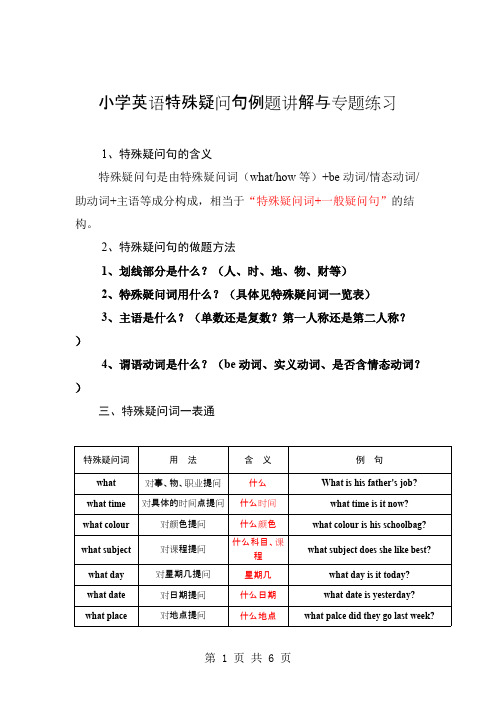
小学英语特殊疑问句例题讲解与专题练习1、特殊疑问句的含义特殊疑问句是由特殊疑问词(what/how等)+be动词/情态动词/助动词+主语等成分构成,相当于“特殊疑问词+一般疑问句”的结构。
2、特殊疑问句的做题方法1、划线部分是什么?(人、时、地、物、财等)2、特殊疑问词用什么?(具体见特殊疑问词一览表)3、主语是什么?(单数还是复数?第一人称还是第二人称?)4、谓语动词是什么?(be动词、实义动词、是否含情态动词?)三、特殊疑问词一表通特殊疑问词用法含义例句what对事、物、职业提问什么What is his father's job?what time对具体的时间点提问什么时间what time is it now? what colour对颜色提问什么颜色what colour is his schoolbag?what subject对课程提问什么科目、课程what subject does she like best?what day对星期几提问星期几what day is it today? what date对日期提问什么日期what date is yesterday? what place对地点提问什么地点what palce did they go last week?who对人提问谁who is that guy beside Tom? whose对所有格提问谁的Whose mobile phone is it? when对时间提问什么时候when dose the football game begin? where对地点提问哪里Where could you go?why对原因提问为什么Why did it cry?which对选择提问哪一个Which is your favourite?how对形容词提问怎么样How is your school?how many对数量提问多少How many e-friends do you have? how much对价格提问多少钱How much is the golden pen? how far对路程提问距离多远How far is the park from your house? how long对一段时间提问时间多长How long could Tom get there? how often对频率提问多久一次How often do you go shopping? how old对年龄提问多大年龄How old is your mother?how soon对多快(时间)提问多快How soon could he run?四、对划线部分提问练习题1. Mike makes cars in a factory .(对划线部分提问)?2. Daniel has a lot of hobbies .(对划线部分提问)?3. His father is a writer . (对划线部分提问)?4. My sister likes dancing .(对划线部分提问)?5. The girl under the tree is my sister .(对划线部分提问)?6. My uncle can teach me Chinese .(对划线部分提问)?7. The pen costs me 10 yuan .(对划线部分提问)?8. Jack’s house is 1 km from our school .(对划线部分提问)?9. There are three people in my family .(对划线部分提问)?10. The girl is so beautiful .(对划线部分提问)?11. Mike often goes to school on foot .(对划线部分提问)?12. It’s 7 o’clock now .(对划线部分提问)?13. Mike plays table tennis three times a week .(对划线部分提问)?14. That man is my English teacher .(对划线部分提问)?15. My e-friend comes from the UK .(对划线部分提问)?16. Millie and I will go to the library tomorrow .(对划线部分提问)?17. My parrot is yellow and green .(对划线部分提问)?18.He goes to bed because he is too tired .(对划线部分提问)?19 . Tomorrow is Wednesday .(对划线部分提问)?20 . We are going to Australia On September 1st.(对划线部分提问)?21 . The schoolbag is mine .(对划线部分提问)?22 . My grandmother is 76 years old .(对划线部分提问)?五、用特殊疑问词填空1、do you like best ? - I like go fishing best .2、do you like best ? - I like the green colour best .3、do you like best ? - I like Lily best.4、do you like best ? - I like that museum best .5、do you like ? - I like the tallest one .6、book do you like best ? - I like Tom’s book best .7、is your school? - My school is big and beautiful .8、do you play football ? - We play football every week .9、do you get up ? - I get up at half past six in the morning .10、is your father? - My father is 36 years old .参考答案:第五题1.where does Mike make cars?2.How many hobbies does David have ?3.What is his father job?/What does his father do ?4. What does your sister like ?5.Who is the girl under the tree ?6.What subject can your uncle teach ?7.How much is the pen ?8.How far is Jack’s house from your school ?9.How many people are there in your family?10.How is the girl ?11.How does Mike often go to school ?12.What time is it now ?13.How often does Mike play table tennis ?14.Who is that man ?15.Where does your e-friend come from ?16.When will Millie and you go to the library ?17.What colour is your parrot ?18.Why does he go to bed ?19. What day is tomorrow ?20.What date are your going to Australia?21.Whose schoolbag is it ?22.How old is your grandmother ?第六题1.what2.what colour3.who4.where5.which6.whose7.how8.how often9.when/what time 10.how old。
完整版)小学一般现在时讲解及练习题
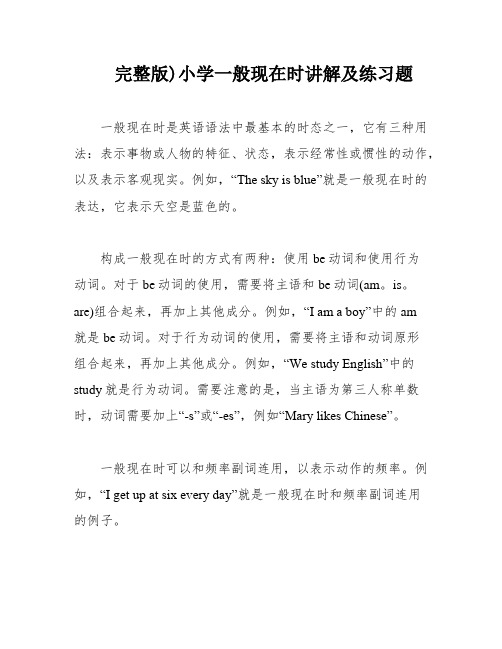
完整版)小学一般现在时讲解及练习题一般现在时是英语语法中最基本的时态之一,它有三种用法:表示事物或人物的特征、状态,表示经常性或惯性的动作,以及表示客观现实。
例如,“The sky is blue”就是一般现在时的表达,它表示天空是蓝色的。
构成一般现在时的方式有两种:使用be动词和使用行为动词。
对于be动词的使用,需要将主语和be动词(am。
is。
are)组合起来,再加上其他成分。
例如,“I am a boy”中的am就是be动词。
对于行为动词的使用,需要将主语和动词原形组合起来,再加上其他成分。
例如,“We study English”中的study就是行为动词。
需要注意的是,当主语为第三人称单数时,动词需要加上“-s”或“-es”,例如“Mary likes Chinese”。
一般现在时可以和频率副词连用,以表示动作的频率。
例如,“I get up at six every day”就是一般现在时和频率副词连用的例子。
一般现在时还可以用于构成否定句、一般疑问句和特殊疑问句。
对于be动词的否定句,需要在be动词后面加上not。
例如,“He is not a worker”就是be动词的否定句。
对于行为动词的否定句,需要在主语和动词原形之间加上don't或doesn't。
例如,“I don't like bread”和“He doesn't often play”就是行为动词的否定句。
对于一般疑问句,需要将be动词或do/does放在主语前面。
例如,“Are you a student?”就是一般疑问句。
对于特殊疑问句,需要在疑问词后面加上一般疑问句。
例如,“Where is my bike?”就是特殊疑问句。
需要注意的是,当主语为第三人称单数时,否定句和一般疑问句需要用doesn't,而不是don't或do。
例如,“He doesn't often play”和“Does she go to work by bike?”就是主语为第三人称单数时的否定句和一般疑问句。
(完整版)英语一般疑问句和特殊疑问句的讲解及练习

一般疑问句用be动词(am /is主语+其他成分,+主语+提问的词.否定:No,+主语+提问的词+not.Are you from Japan﹖Yes ,I am./ No, I'm not.Is her sister doing her homework now﹖Yes, she is./ No, she isn't.Does he work in a bank﹖Yes, he does./ No, he doesn't.Can you speak French﹖Yes, I can./ No, I can't.一: 般疑问句还有下列特点:1、以be动词、助动词或情态动词开头;例:Is your father a teacher? Does Catherine like animals? Can Jenny speak French?二: 如何将陈述句变成一般疑问句?1.如句中有be 动词(am、is、are、was、were can、may、must …)或助动词(do、does、did、have、had(完成时中))时,可直接将它们提到句首,句末打上问号即可。
主语为第一人称,应将其改为第二人称。
例:It was rainy yesterday.→Was it rainy yesterday?Tom's father can play the piano.→Can Tom's father play the piano?I have finished my homework.→Have you finished your homework?2.如果句中没有be动词、助动词或情态动词,则根据谓语动词的形式借助do的相应形式放在句首。
具体方法是:如果谓语动词是原形,则借do;如果谓语动词是一般现在时第三人称单数形式,则借does;如果谓语动词是过去式,则借did. 需要注意的是,借does或did后,原句的谓语动词要变回原形。
一般、特殊、选择疑问句专题讲解(附习题答案)

“一般疑问句”【概念】: 一般疑问句是指用Yes / No来回答的疑问句,读时要用升调。
eg: ---Is this your pencil 这是你的铅笔吗---Yes, it is. 是的,它是。
:--- Are those bananas 那些是香蕉吗--- No, they aren’t. 不,它们不是。
【结构】:1. 连系动词be +主语+其他回答时主语必须为相应的人称代词,且为主格形式。
肯定回答:Yes, 主语+ be.否定回答:No, 主语+ be not.be和not可缩写为:isn’t, aren’t, wasn’t, weren’t【例句】①—Are they all here 他们都在这儿吗—Yes, they are. / No, they aren’t. 是的,他们都在。
/不,他们不在。
)②—Is your father a musician—No, he is.2. 情态动词+ 主语+动词原形+其他肯定回答:Yes, 主语+情态动词.否定回答:No, 主语+情态动词+ not.情态动词和not可缩写为:can’t, mustn’t, needn’t, shouldn’t.【例句】①— Can the boy play the guitar 那个男孩会弹吉他吗---Yes, he can. / No, he can’t. 是的,他会。
/ 不,他不会。
②—Can you swim—Yes, I can.[3. 助动词( Do / Does / Did)+主语+动词原形+其他肯定回答:Yes, 主语+ do / does / did.否定回答:No, 主语+ do / does / did+ not.(助动词和not也常用缩写形式:don’t, doesn’t, didn’t.【例句】①—Do you want to go to the movie 你想去看电影吗—Yes, I do. / No, I don’t. 是的,我想去。
(完整版)一般现在时讲解+练习
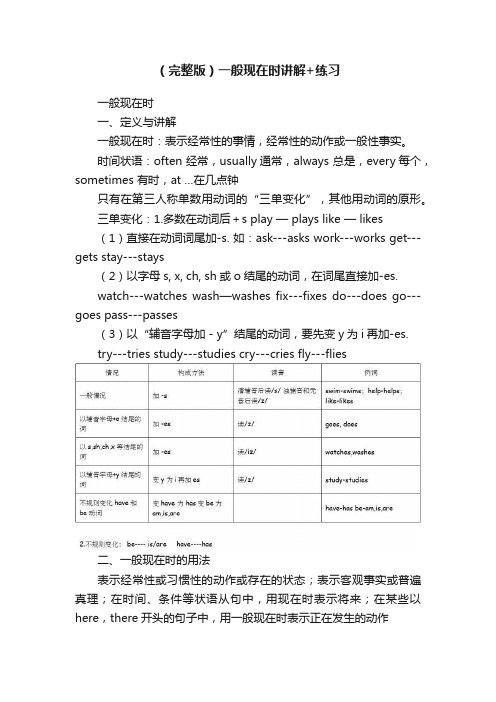
(完整版)一般现在时讲解+练习一般现在时一、定义与讲解一般现在时:表示经常性的事情,经常性的动作或一般性事实。
时间状语:often 经常,usually通常,always 总是,every每个,sometimes 有时,at …在几点钟只有在第三人称单数用动词的“三单变化”,其他用动词的原形。
三单变化:1.多数在动词后+s play — plays like — likes(1)直接在动词词尾加-s. 如:ask---asks work---works get---gets stay---stays(2)以字母s, x, ch, sh或o结尾的动词,在词尾直接加-es.watch---watches wash—washes fix---fixes do---does go---goes pass---passes(3)以“辅音字母加 - y”结尾的动词,要先变y为i再加-es.try---tries study---studies cry---cries fly---flies二、一般现在时的用法表示经常性或习惯性的动作或存在的状态;表示客观事实或普遍真理;在时间、条件等状语从句中,用现在时表示将来;在某些以here,there开头的句子中,用一般现在时表示正在发生的动作当主语是第三人称单数时:1、动词变相应的第三人称单数形式2、肯定句主语+动词s+其它3、否定句主语+doesn't+动词原形+其它4、一般疑问句Does+主语+动词原形+其它5、肯定回答 Yes,主语+does6、否定回答 No,主语+doesn't7、特殊疑问句特殊疑问词+一般疑问句当主语不是第三人称单数时:1、肯定句主语+动词原形+其它2、否定句主语+don't+动词原形+其它3、一般疑问句 Do+主语+动词原形+其它4、要注意,句式结构错则全都错。
5、谓语动词的形式:do/does一般现在时练习一、用所给词的正确形式填空1. We often ___________ (play) on the playground.2. He _________ (get) up at six o’clock.3. __________you _________ (brush) your teeth every morning.4. What____ (do) he usually _____ (do) after school?5. Danny _______ (study) English, Chinese, Math, Science and Art at school.6. Mike sometimes __________ (go) to the park with his sister.7. At eight at night, she ________ (watch) TV with his parents.8. ________ Mike________ (read) English every day?9. How many lessons ______your classmate____ (have) on Monday?10. What time ____his mother_________ (do) the housework?11. He often ______ (have) dinner at home. 12. Daniel and Tommy___ (be) in Class One. 13. We____ (not watch) TV on Monday. 14. Nick _____(not go) to the zoo on Sunday.15. They______ (like) the World Cup? 16. What ____they often ____ (do) on Saturdays17. Your parents________ (read) newspapers every day?18. The girl______ (teach) us English on Sundays.19. She and I _______ (take) a walk together every evening.20. There_______ (be) some water in the bottle. 21. Mike ______ (like) cooking.22. They_______ (have) the same hobby. 23. My aunt______ (look) after her baby carefully.24. You always____ (do) your homework well. 25. I_____ (be) ill. I’m sta ying in bed.26. She_____ (go) to school from Monday to Friday. 27. Liu Tao _____ (do) not like PE.28. The child often______ (watch) TV in the evening.29. Su Hai and Su Yang ______(have) eight lessons this term.30. -What day ______(be) it today? -It’s Saturday.31. Don’t make a noise. Grandpa __________ (sleep).32. Tom’s family__________ (watch) TV.33. It ________ (take) me two hours to finish my homework last night.34. What ______ your mother _______ (do) every evening? She_______ (wash) clothes.35. _______ it ______ (rain) every day?36. What _______ (do) you _______ on Sundays? We ________ (play) football.37. There ________ (be) a football match on TV every morning.38. They often ________ (visit) the Great Wall.39. Who _______ (dance) the best in your class?40. He _____________ (not come).41. The earth __________ (move) round the sun.42 She ________ (buy) a sweater.43. Mr. Wang often______ (go) to Shanghai.二、改句子1. Do you often play football after school? (肯定回答)_______________________________2. I have many books. (改为否定句)_______________________________3. Gao Shan's sister likes playing table tennis (改为否定句)________________________4. She lives in a small town near New York. (改为一般疑问句)________________________5. I watch TV every day. (改为一般疑问句)________________________6. David has a goal. (改为一般疑问句)________________________7. We have four lessons.(否定句)________________________8. Nancy doesn’t run fast (肯定句)________________________9. My dog runs fast. (一般疑问句) ________________________(把10—14小题变否定句,一般疑问句和划线提问)10. Mike has two letters for him. ________________________11. I usually play football on Friday afternoon.________________________12. Su Yang usually washes some clothes on Saturday. ________________________13. Mingming usually waters the flowers every day. ________________________14. Tom does his homework at home. ________________________三、写出下列动词的第三人称单数形式:1. wash_________ match _______ guess______ study______finish_________ go________ snow______ carry_________2. stop______ see________ drive ________let_______ carry______keep_____ join______ find_______ think________ teach______ catch______3. stay_______ begin______ forget_______ lie________ die _______run_______ prefer______ give________ ring_______ dance______ hope_______四、单项选择:1. There _____ an English film at the cinema now.A. will haveB. is going to haveC. is going to beD. is2. The picture _______ nice. A. looks B. is looked C. look D. is looking3. She ______ down and soon falls asleep. A. live B. lain C. laidD. sits4. They _____ the office in time very morning. A. reach to B. arrived C. went D. get to5. We shall go to Shanghai on business before you _____ back next week.A. will comeB. cameC. would comeD. come6. The plane ______ over there. A. is B. are C.am D. was7. I see her ____ the room this morning. A. to enter B. enteredC. enterD. enters8. The teacher ________us to come to school on time. A. ask B. asking C. asks D. asked9. John always ______ others. A. help B. helping C. helps D. to help10. He ______for eight hours every day. A. working B. to workC. worksD. worked11. You’d better ______ at home and ______ your homework.A. to stay, doB. stay, doC. to stay, to doD. stay, to do12. He sits down and ______ a rest. A. having B. have C. to haveD. has13. Uncle Wang never ______ a cake. A. make B. to make C. making D. makes五、请写出下列句子1.他每天早上七点乘公交车去上学。
(完整)一般现在时讲解与练习(初中英语)
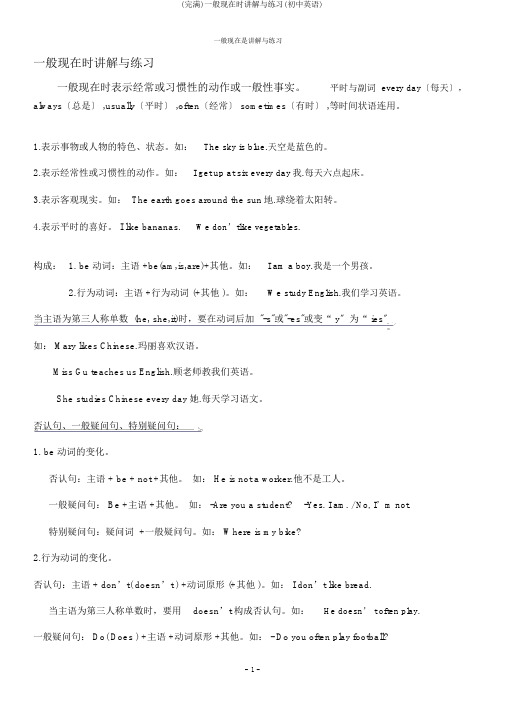
一般现在是讲解与练习一般现在时讲解与练习一般现在时表示经常或习惯性的动作或一般性事实。
平时与副词 every day〔每天〕,always〔总是〕 ,usually〔平时〕 ,often〔经常〕 sometimes〔有时〕 ,等时间状语连用。
1.表示事物或人物的特色、状态。
如:The sky is blue.天空是蓝色的。
2.表示经常性或习惯性的动作。
如:I get up at six every day我.每天六点起床。
3.表示客观现实。
如: The earth goes around the sun地.球绕着太阳转。
4.表示平时的喜好。
I like bananas.We don’tlike vegetables.构成: 1. be 动词:主语 +be(am,is,are)+其他。
如:I am a boy.我是一个男孩。
2.行为动词:主语 +行为动词 (+其他 )。
如:We study English.我们学习英语。
当主语为第三人称单数 (he, she,it)时,要在动词后加 "-s"或"-es"或变“ y〞为“ ies〞如: Mary likes Chinese.玛丽喜欢汉语。
Miss Gu teaches us English.顾老师教我们英语。
She studies Chinese every day她.每天学习语文。
否认句、一般疑问句、特别疑问句:1. be 动词的变化。
否认句:主语 + be + not +其他。
如: He is not a worker.他不是工人。
一般疑问句: Be +主语 +其他。
如: -Are you a student?-Yes. I am. / No, I’m not.特别疑问句:疑问词 +一般疑问句。
如: Where is my bike?2.行为动词的变化。
否认句:主语 + don’t( doesn’t ) +动词原形 (+其他 )。
最新一般现在时讲解以及练习题资料

语法讲解一:一般现在时一般现在时的讲解思路:一、定义二、一般现在时常用时间状语、时间副词三、用法:1 •肯定句:2.否定句:3.疑问句:4.特殊疑问句:一般现在时的讲解以及练习题一、定义:一般现在时表示经常或习惯性的动作,也可表示现在的状态或主语具备的性格和能力。
例:(1).表示事物或人物的特征、状态。
The sky is blue. 天空是蓝色的。
(2).表示经常性或习惯性的动作。
I get up at six every day. 我每天六点起床。
(3).表示客观现实。
The earth goes around the sun. 地球绕着太阳转。
二、一般现在时常用时间状语、时间副词In the morni ng/afterno on /eve ningevery week (day, year, mon th…)on Sun days (Mon day, Tuesday-)at ni ght, once a week,.Always 总是,usually 通常,often 经常,sometimes有时,never 从不三、用法:1 •肯定句:(1) 句中有be (am is , are )和情态动词时,①be动词时,主语是I时要用am主语是you时要用are ,其他用is②是情态动词时,后面的动词用原型③例:I am a student.You are very beautiful.She is my best friend.He can do his homework by himself(2)没有be (am is, are )动词和情态动词:主语为第三人称单数(she ,he ,it )、单数可数名词、不可数名词的,动词要按规则加上s或es;主语是复数可数名词的肯定句,动词用原形。
例:①She(He, It )likes fish. 她(他,它)喜欢鱼。
(主语为第三人称单数②The table has four legs.桌子有四条腿。
(完整版)一般疑问句和特殊疑问句_讲解及练习
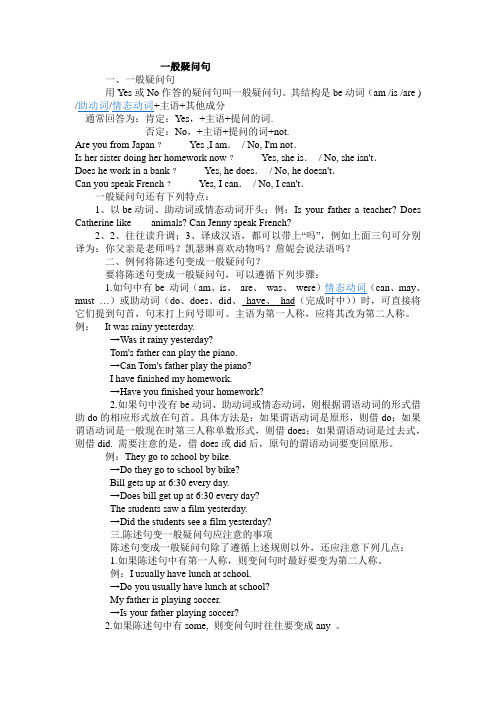
一般疑问句一、一般疑问句作答的疑问句叫一般疑问句。
其结构是be动词(am /is /are )主语+其他成分Yes,+主语+提问的词.否定:No,+主语+提问的词+not.Are you from Japan﹖Yes ,I am./ No, I'm not.Is her sister doing her homework now﹖Yes, she is./ No, she isn't.Does he work in a bank﹖Yes, he does./ No, he doesn't.Can you speak French﹖Yes, I can./ No, I can't.一般疑问句还有下列特点:1、以be动词、助动词或情态动词开头;例:Is your father a teacher? Does Catherine like animals? Can Jenny speak French?2、2、往往读升调;3、译成汉语,都可以带上“吗”,例如上面三句可分别译为:你父亲是老师吗?凯瑟琳喜欢动物吗?詹妮会说法语吗?二、例何将陈述句变成一般疑问句?1.如句中有be 动词(am、is、are、was、were can、may、must …)或助动词(do、does、did、have、had(完成时中)它们提到句首,句末打上问号即可。
主语为第一人称,应将其改为第二人称。
例:It was rainy yesterday.→Was it rainy yesterday?Tom's father can play the piano.→Can Tom's father play the piano?I have finished my homework.→Have you finished your homework?2.如果句中没有be动词、助动词或情态动词,则根据谓语动词的形式借助do的相应形式放在句首。
(完整版)初一英语各种时态复习及练习题
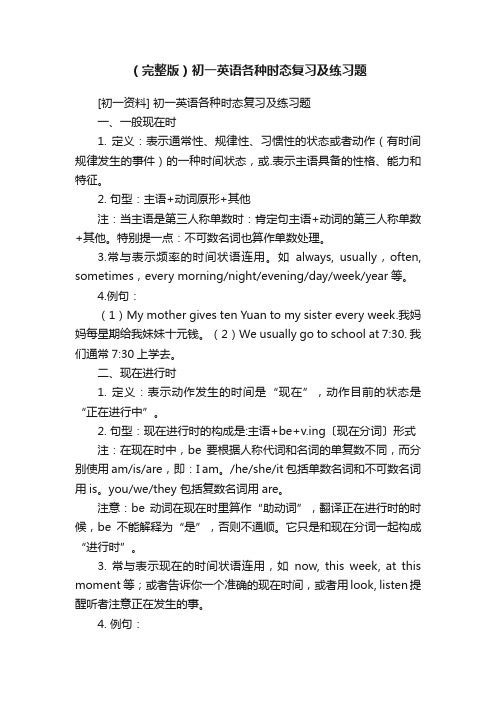
(完整版)初一英语各种时态复习及练习题[初一资料] 初一英语各种时态复习及练习题一、一般现在时1. 定义:表示通常性、规律性、习惯性的状态或者动作(有时间规律发生的事件)的一种时间状态,或.表示主语具备的性格、能力和特征。
2. 句型:主语+动词原形+其他注:当主语是第三人称单数时:肯定句主语+动词的第三人称单数+其他。
特别提一点:不可数名词也算作单数处理。
3.常与表示频率的时间状语连用。
如always, usually,often, sometimes,every morning/night/evening/day/week/year等。
4.例句:(1)My mother gives ten Yuan to my sister every week.我妈妈每星期给我妹妹十元钱。
(2)We usually go to school at 7:30. 我们通常7:30上学去。
二、现在进行时1. 定义:表示动作发生的时间是“现在”,动作目前的状态是“正在进行中”。
2. 句型:现在进行时的构成是:主语+be+v.ing〔现在分词〕形式注:在现在时中,be 要根据人称代词和名词的单复数不同,而分别使用am/is/are,即:I am。
/he/she/it 包括单数名词和不可数名词用is。
you/we/they 包括复数名词用are。
注意:be 动词在现在时里算作“助动词”,翻译正在进行时的时候,be不能解释为“是”,否则不通顺。
它只是和现在分词一起构成“进行时”。
3. 常与表示现在的时间状语连用,如now, this week, at this moment 等;或者告诉你一个准确的现在时间,或者用look, listen提醒听者注意正在发生的事。
4. 例句:(1)They are playing basketball now.现在他们正在打篮球。
(2)Listen! She is singing a song.听,她正在唱歌。
一般疑问句和特殊疑问句(附练习题及答案
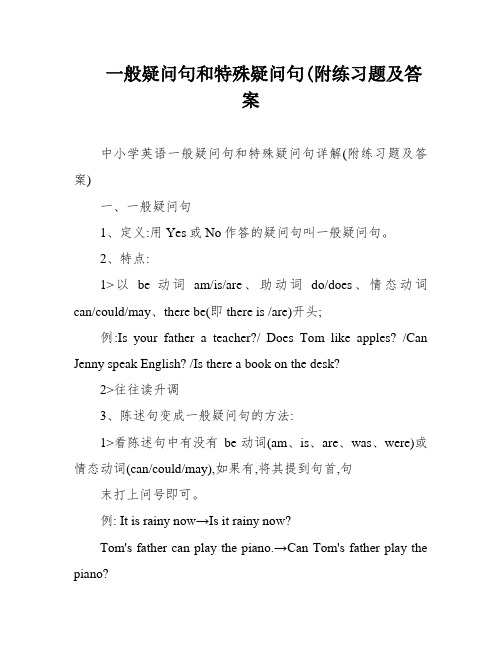
一般疑问句和特殊疑问句(附练习题及答案中小学英语一般疑问句和特殊疑问句详解(附练习题及答案)一、一般疑问句1、定义:用Yes或No作答的疑问句叫一般疑问句。
2、特点:1>以be动词am/is/are、助动词do/does、情态动词can/could/may、there be(即there is /are)开头;例:Is your father a teacher?/ Does Tom like apples? /Can Jenny speak English? /Is there a book on the desk?2>往往读升调3、陈述句变成一般疑问句的方法:1>看陈述句中有没有be动词(am、is、are、was、were)或情态动词(can/could/may),如果有,将其提到句首,句末打上问号即可。
例: It is rainy now→Is it rainy now?Tom's father can play the piano.→Can Tom's father play the piano?There is a book on the desk.→Is th ere a book on the desk?2>如果句中没有be动词或情态动词,句首加do的相应形式(do、does、did),且原句的谓语动词要变回原形。
1.They go to school by bike.→Do they go to school by bike?2.Bill gets up at 6:30 every day.→Does bill gets up at 6:30 every day?3.The students saw a film yesterday.→Did the students see a film yesterday?注: 1)如果陈述句中有第一人称,则变问句时要变为第二人称。
小学英语一般现在时知识点全面讲解附练习及答案
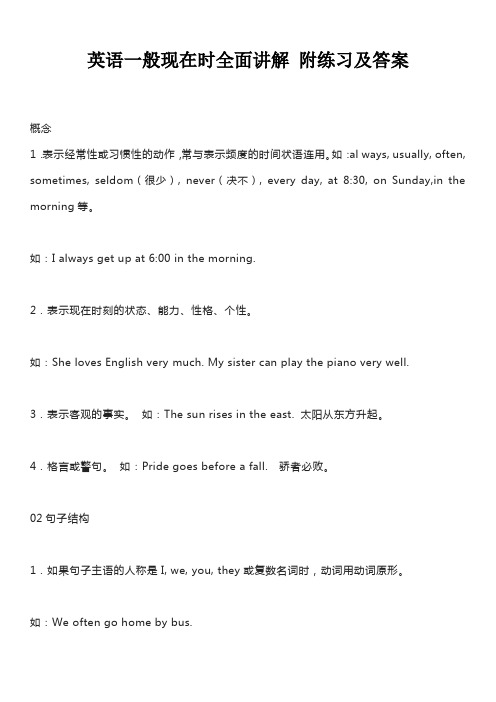
英语一般现在时全面讲解附练习及答案概念1.表示经常性或习惯性的动作,常与表示频度的时间状语连用。
如:al ways, usually, often, sometimes, seldom(很少), never(决不), every day, at 8:30, on Sunday,in the morning等。
如:I always get up at 6:00 in the morning.2.表示现在时刻的状态、能力、性格、个性。
如:She loves English very much. My sister can play the piano very well.3.表示客观的事实。
如:The sun rises in the east. 太阳从东方升起。
4.格言或警句。
如:Pride goes before a fall. 骄者必败。
02句子结构1.如果句子主语的人称是I, we, you, they或复数名词时,动词用动词原形。
如:We often go home by bus.2.如果句子的主语是第三人称单数,即:he, she, it 或单数名词时,动词要用第三人称的单数形式。
如:He often goes home by bus03动词的第三人称单数构成规则1.一般情况下在动词的后面直接加“s”;如:work→works play→plays¬ rain→rains see→sees visit→visits2.以o, x,s,sh, ch结尾的动词,在后面加“es”;如:do→does fix→fixes guess→guesses wash→washes teach→teaches3.以辅音字母加y结尾的动词,先把“y”改为“i”, 再加“es”;如:fly→flies study→studies carry→carries4.不规则变化。
如:have→has04注意在一般现在时的句子中,如果前面使用了助动词does, doesn’t, will, won’t, can, can’t, would, wouldn’t, must, mustn’t 等,尽管主语是第三人称单数,后面的动词用动词原形。
(完整版)一般现在时的讲解及练习题
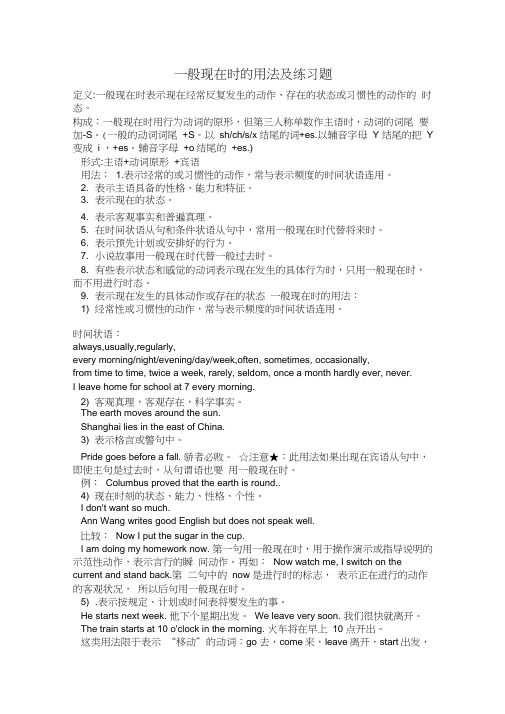
一般现在时的用法及练习题定义:一般现在时表示现在经常反复发生的动作、存在的状态或习惯性的动作的时态。
构成:一般现在时用行为动词的原形,但第三人称单数作主语时,动词的词尾要加-S。
(一般的动词词尾+S。
以sh/ch/s/x结尾的词+es.以辅音字母Y 结尾的把Y 变成i ,+es。
辅音字母+o结尾的+es.)形式:主语+动词原形+宾语用法: 1.表示经常的或习惯性的动作,常与表示频度的时间状语连用。
2. 表示主语具备的性格、能力和特征。
3. 表示现在的状态。
4. 表示客观事实和普遍真理。
5. 在时间状语从句和条件状语从句中,常用一般现在时代替将来时。
6. 表示预先计划或安排好的行为。
7. 小说故事用一般现在时代替一般过去时。
8. 有些表示状态和感觉的动词表示现在发生的具体行为时,只用一般现在时,而不用进行时态。
9. 表示现在发生的具体动作或存在的状态一般现在时的用法:1) 经常性或习惯性的动作,常与表示频度的时间状语连用。
时间状语:always,usually,regularly,every morning/night/evening/day/week,often, sometimes, occasionally,from time to time, twice a week, rarely, seldom, once a month hardly ever, never.I leave home for school at 7 every morning.2) 客观真理,客观存在,科学事实。
The earth moves around the sun.Shanghai lies in the east of China.3) 表示格言或警句中。
Pride goes before a fall. 骄者必败。
☆注意★:此用法如果出现在宾语从句中,即使主句是过去时,从句谓语也要用一般现在时。
例:Columbus proved that the earth is round..4) 现在时刻的状态、能力、性格、个性。
小学英语《一般现在时》重点讲解附专项练习和答案

小学英语《一般现在时》重点讲解,附专项练习和答案一般现在时:主要描述经常会发生的动作、状态或不变的真理。
句末常出现every day/week/year/Monday , in the morning;句中常有always, usually, often, sometimes组成:1.主语+be+名词(形容词)I am a student.He is tall.否定句:在be 后加notI am not a student.He is not tall.疑问句:be 动词提前到第一位。
Are you a student?Yes,I am./No,I am not.Is he tall?Yes,he is./No,he isn’t.组成:2.主语+动词+地点+时间We go to school on Monday.He goes to the park on Sunday.否定句:主语+don’t/doesn’t’t+动词原形+地点+时间We don’t go to school on Monday.He doesn’t go to the park on Sunday.疑问句:在句首加do或doesDo you go to school on Monday?Yes, we do./ No, we don’t.Does he go to the park on Sunday?Yes, he does./ No, he doesn’t.动词第三人称单数变化1. 在原单词末尾加s , 如:like –likes2. 单词以o, sh, ch, s, x 结尾加es, 如:go –goes3. 单词末尾为辅音+y结尾去y加ies 如:study- studies一般现在时练习题一、写出下列动词的第三人称单数形式。
eat read do take washwatch have carry study f lycatch go have cook looksing teach like get come play二、用单词的正确形式填空:1. Mike ___________ (do) his homework every day.2. There ____________ (be) some water in the glass.3. We like ____________ (play) basketball after class.4. I like singing. I often ____________ (listen) to the music in the evening.5. My grandma ___________ (watch) TV every day.三、选择最佳的答案:1. ____Alice often play the piano. No, she _____.A. Do; doB. Does; doesC. Does; doesn't2. ___ your penfriend __ in Beijing?A. Do; liveB. Do; livesC. Does; live3. Tom and Mike __ very excited, they will take a trip.A. isB. areC. am4. I like ________ very much. What about you?A. danceB. dancedC. dancing5. I can’t find my pen. Let me __.A. go and ask herB. go and ask hersC. go and ask she6. Fangfang is a good student. She ____maths.A. does good atB. well do itC. is good at7. The kite ____ a bird. A. look like B. is looking C. looks like8. Bill and I ___ good friends.A. isB. areC. am9. Sandy often ___ his homework on Sundays .A. doB. doesC. did10. What do you usually do on the weekend? I __________.A. went swimmingB. go swimmingC. visited grandparents11. What do you usually do on your holiday?A. saw elephantsB. sing and danceC.took picture12. I ____ a student. I go to school ____bus every day.A. is; byB. am; onC. am; by13. I ____ a brother. She ____ a sister.A. have; hasB. has; hasC. have; have14. You ____ a student. He ____ a teacher.A. is; isB. are; isC. are; are15. He always _____ football games.A. watchesB. watchC. doesn't16. My best friend _____ shells.A. collectsB. collectC. often17. She doesn’t _____ listening to the music.A. oftenB. likeC. likes18. My mother and I ___ always watch romantic films.A. doesn’tB. don’tC. do19. ---When _____ he get home on Friday?----He gets home at four on Friday.A. doB. doesC. did小学英语时态练习题答案一般现在时练习题一、写出下列动词的第三人称单数形式。
- 1、下载文档前请自行甄别文档内容的完整性,平台不提供额外的编辑、内容补充、找答案等附加服务。
- 2、"仅部分预览"的文档,不可在线预览部分如存在完整性等问题,可反馈申请退款(可完整预览的文档不适用该条件!)。
- 3、如文档侵犯您的权益,请联系客服反馈,我们会尽快为您处理(人工客服工作时间:9:00-18:30)。
般现在时一、定义与讲解1、一般现在时:表示经常性的事情,经常性的动作或一直存在事实和状态。
比如:he is aboy. (表示一直存在的事实)He goes go work every day (表示经常性的事情)下面的句子都是一般现在时,请你参考:(1)I like swimming.(2)He wants to go to sleep.(3)They usually go to school by bike.(4)I take the medicine three times a day.(5)She helps her mother once a week.(6)Mary's father is a policeman.(7)There are 50 students in my class.2、一般现在时的用法及变形. 一般现在时要注意以下几点:(1)有am,is,are 及情态动词的句型变疑问句调换am,is,are 及情态动词和主语的位置,否定回答在am,is,are 及情态动词的末尾加not. 否定句直接在后面加not.例如:he is a student. - Is he a student ? - Yes,he is./No, he isn ' t. He is a student - he isn 'at student. I can ride bike. - can you... I can 't...(2)有动词的句型变疑问句在句首加上助动词Do,第三人称单数加Does.否定回答在Do 或Does 后面加not例如:I like swimming . - Do you like swimming ? - Yes, i do/ No, i don' t. I like swimming. - I don' tli ke swimming.(3)第三人称单数在动词的末尾要加s 或es ,以s,ch,sh 结尾的单词加es,特殊单词特殊记. 例如:He goes to school at 7:00 every day.要特别注意在什么情况要使用一般现在时 .现在请你完成一些练习,让你更熟练地掌握一般现在时:(一).用动词的适当形式填空1.She _________ (go) to school at seven o' clock.3.He usually ___________ up at 17:00.(get )4.She ___________ (live) in Beijing.7.My father __________ (watch) TV every evening .9. _______ Amy __________ (read) English every day10. Chen Jie sometimes __________ (go)to the park with her sister.二).选择填空1.I want _ h omework now.A. doingB. to doC. to do myD. do my2.It's time __ .A. go to schoolB. play gamesC. to go homeD. to do my homeworks 3.go and helpher.A. Let's meB. Let's usC. Let'sD. Let's to4.Do they have a new car? Yes, ____ .A .they are B.they have C. they don't D. they do5.He often _______ supper at 6:00 in the evening.A. haveB. has c. is having D. is eating6.We ______________ any Chinese classes on Friday.A. are havingB. aren 'th avingC. don'th aveD. are have三)、用括号内动词的适当形式填空。
1.He often _________ (have) dinner at home.2.Daniel and Tommy __________ (be) in Class One.3.We __________ (not watch) TV on Monday.4.Nick _________ (not go) to the zoo on Sunday.5.they ________ (like) the World Cup?6.What they often ________ (do) on Saturdays?7.your parents ________ (read) newspapers every day?8.The girl ________ (teach) us English on Sundays.9.She and I _________ (take) a walk together every evening.10.There __________ (be) some water in the bottle.11.Mike ________ (like) cooking.12.They _________ (have) the same hobby.13.My aunt _________ (look) after her baby carefully.14.You always _________ (do) your homework well.15.I ________ (be) ill. I ' ms taying in bed.四)、按要求改写句子。
1.Do you often play football after school? ( 肯定回答)2.I have many books. (改为否定句)3.Gao Shan' ss ister likes playing table tennis (改为否定句)4. She lives in a small town near New York. (改为一般疑问句)5. I watch TV every day. (改为一般疑问句)6. David has got a goal. (改为一般疑问句)7. We have four lessons.(否定句)8. Nancy doesn' tr un fast (肯定句)9. My dog runs fast. 否定句:般疑问句和特殊疑问句1、一般疑问句的定义:对于只用Yes 或No 来回答的疑问句我们叫一般疑问句.2、特殊疑问句的定义:对句子当中某一部分内容的提问我们要用特殊疑问句,比如问时间用When 或者what time 问地点用where... 这里我们主要学习特殊疑问句的用法.3、特殊问句的用法:特殊问句是由疑问词+ 一般疑问句组成,那么在我们使用特殊问句时,要先选好疑问词,特殊疑问词有很多,需要长期积累。
例如:I want to go to sleep now. 如果对go to sleep 提问,那么我们应该问你想要做什么,首先应选择疑问词what ,再将剩下的句子变为一般问句即可.What do you want to do ?下面请你完成一些练习:一、选择正确的单词填空(who, where, when)1. ___ is that pretty girl? She is my sister.2. ___ are Jack and Tom? They are behind you.3. ___ do you go to school? I go to school from Monday to Friday.4. ___ has a beautiful flower? John has a beautiful flower.5. ___ are they? They are my parents.6. ___ is my mother? She is in the living room.7. ___ are you going? We are going to the bakery( 面包坊).8. ___ do Jim and Wendy play ball? They play ball in the afternoon.9. ___ does he jog? He jogs in the park.10.__ are you from? I'm from Changchun city.二、就画线部分提问1.He is my father.2.They are under the tree.3.I o ften watch TV after dinner.(晚饭后)提示:饭后强调的是时间问题4.Lily swims in the swimming pool.(游泳池)5.Superman flies in the sky.6.I o ften brush my teeth in the evening.7.Alan likes to play with Bill.8.Joe's father plays badminton(羽毛球) every weekend.9.The supermarket is near the school.10.The laptop(笔记本电脑) is on the table.11.Jennifer has a pair of earrings(耳环).12.The flowers are in the flower pot(花盆).13.My grandpa took us to the zoo.14.I put the gold fish(金鱼) into the fish tank(鱼缸).15.The monkey sleeps at night.特殊疑问句练习(二)一.用what time, what color, what day, what 填空。
1.A: _____ _____ is it? B: It is nine o ' clock.2.A: _____ _____ does your mother get up?B: My mother gets up at 6:30.3.A: _____ _____ do you go to bed? B: I go to bed at 10:00.4.A: _____ _____ do Diana and Fiona have supper?B: Diana and Fiona have supper at 18:00.5.A: _____ _____ is it? B: It is purple.6.A: _____ _____ is the sky? B: The sky is blue.7.A: _____ _____ is your coat? B: My coat is black.8.A: _____ _____ is the dog? B: The dog is white.9.A: _____ _____ is today? B: Today is Monday.10.A: _____ ______ is tomorrow? B: Tomorrow is Tuesday. 二.连线:(Match )1. What ' s on the chair?2.How is your father?3.What are these?4.What is in the bag?5.How do you go to school?6.How much is it?7.What time is it?8.When do you wash your face?9.How many hands do you have? I10.When do you have lunch? There is a book in the bag.These are apples.I go to school by bus.The radio is on the chair.My father is fine.I wash my face in the morningI have two hands.It is four o ' clock.It is 5 RMB(人民币).今日的作业:1、请你分别写出10个一般现在时的句子,10 个一般疑问句并做回答,10和特殊疑问句并作回答。
